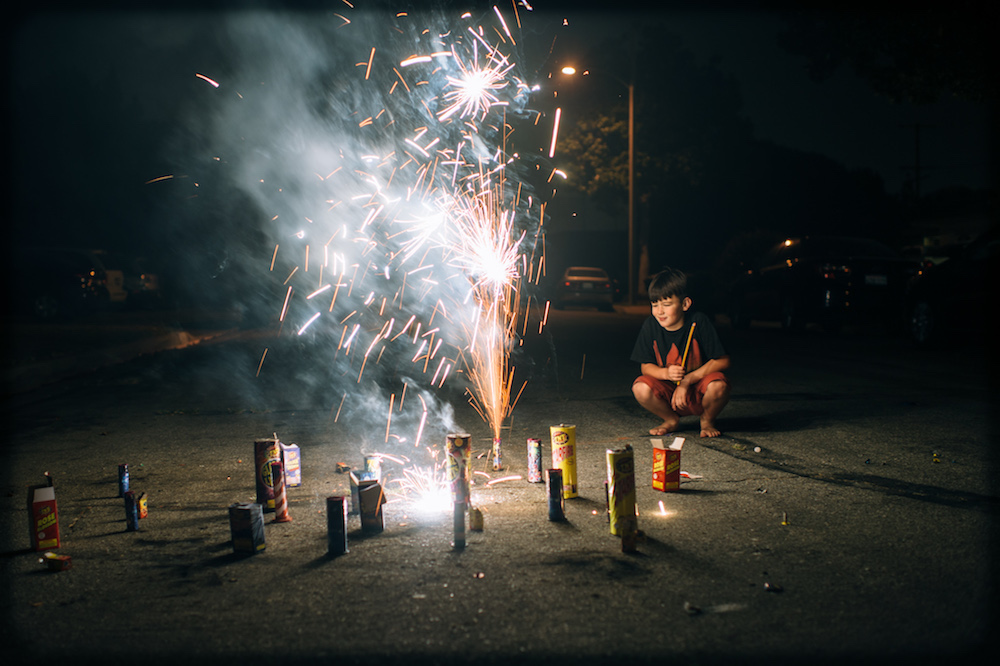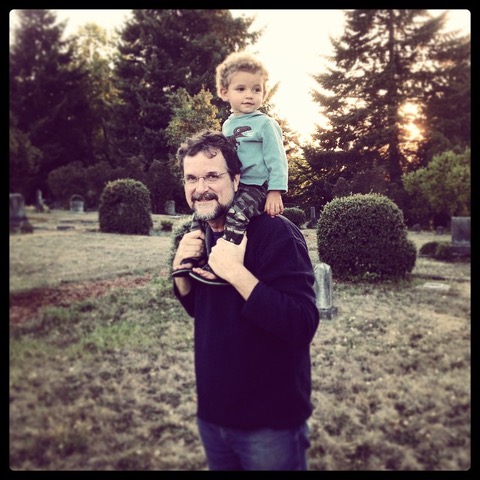Flash Nonfiction by Scott Fleming
Tennis Ball or Bomb?

In 1967, I was seven years old and blissfully unaware of how much the outside world was coming apart at the seams. My middle-class, suburban neighborhood in central Connecticut must have had a protective shell over it since the 1950s. The anti-war protests, the racial tension, the burgeoning drug culture, the feminist movement, the sexual revolution—these were all abstract concepts that, had they not been delivered daily into our living rooms via the six o’clock news, wouldn’t have existed at all.
Nothing epitomized the happily insulated nature of life on High Street like our annual summer block party. On a Saturday morning in mid-July, wooden blockades at the top and bottom of the street would seal off the parallel rows of modest, early twentieth-century colonial-style homes from the rest of the world.
I was one of a tribe of kids who weaved through the crowd of young and old in the early afternoon, repeatedly filling my paper plate with the burgers and dogs that Mr. Perkins dispensed from his Royal Chef grill. Shortly after the last watermelon seed was spit onto the pavement and the last drop of Hawaiian Punch coaxed from the can, a couple of the older kids rounded up the troops for a massive Wiffle ball game in the Colemans’ backyard. Circling the makeshift bases in the late afternoon sun, we shouted the names of the Yankees and Red Sox players who inspired our heroics: Mickey Mantle, Carl Yastrzemski, Tony Conigliaro.
Later, word circulated that Mr. Perkins had held back some fireworks from the Fourth of July. As we slowly migrated back to the street in the fading twilight, I sidled up alongside my best friend Jimmy, who was a year younger and lived two houses up from me. Together we sat on the curb a safe distance from the action, heads tilted upward, as Roman candles rocketed toward the stars.
The shimmering light that burst across the sky brought into relief the dense thicket of elm trees at the bottom of the street. The tremulous flashes lent an air of promise and mystery to the stomping grounds where Jimmy and I spent countless afternoons hacking through tangles of bushes and branches, forging a path of our own to some unknown world.
• • •
By the time I turned nine, however, both external and internal forces began to chip away at the veneer of my idyllic childhood. Sometimes I felt an unnameable foreboding—a harbinger that my easy state of grace was beginning to slip away.
Television images started to penetrate and haunt my quiet moments: the escalating war in Vietnam and the street protests, the assassinations of Martin Luther King and Robert Kennedy, the race riots. In addition, fleeting moments of awkward self-consciousness welled up from somewhere inside and, at times, undermined the natural, spontaneous life I’d known.
One spring Saturday afternoon, Jimmy and I sat on my front porch, bored, trying to figure out what to do with ourselves, when down the sidewalk sauntered an emissary from another neighborhood. Michael was a pudgy only child with wavy black hair in my fourth-grade class. He was a natural fabulist whose bible, the Guinness World Records book, provided the raw material for an endless supply of fantastical stories that he embellished with unbridled enthusiasm—punctuated by bursts of spittle that flew from his always-glistening lips. To me, Michael was a bit of a kook, and there were times, particularly when I was hanging around the older kids, I wished he weren’t so inclined to gravitate toward me.
But on this particular languorous day, he turned out to be our savior. Under his influence, Jimmy and I soon found ourselves running breathlessly and urgently through the neighborhood. One minute we were scurrying from tree to tree across multiple backyards in an attempt to elude an unknown assailant. The next minute we were standing on top of a pile of dirt in Jimmy’s backyard, fighting off an encroaching enemy with sword-sticks. A few strategic thrusts straight to the gut, followed by a merciless whack across the side of the head, and the neighborhood invaders were vanquished.
The day came to a final, crashing culmination at the bottom of the street across from the woods as the sun was going down. The three of us stood close together as if in a football huddle. In Michael’s hand was a beat-up tennis ball that he held out in the center of the circle for our review.
“You see these cracks?” he asked, tracing the seam lines with his finger. “It’s because somebody planted a bomb in here.”
Michael looked back and forth between Jimmy and me.
It was at this moment that I suddenly felt unsettled. It was as if I were standing outside myself watching the scene unfold from a vantage point just slightly above, perched precariously on a balance beam. On one side were Michael and Jimmy gaping at the purported bomb with wide-open, believing eyes. On the other side was an emerging version of me for whom a tennis ball was a tennis ball was a tennis ball. When the image vanished, I quickly turned to Michael.
“Throw it!” I screamed.
Michael turned his body to the side, reached his arm back as far as it would go, and launched the tennis ball sky-high, sending it soaring across the street toward the woods. None of us waited for it to hit. We turned in unison and started sprinting back up the street. As my legs churned, I braced myself for the anticipated explosion and the shaking of the ground beneath my feet—hoping I’d make it back to the safety of my front porch before the woods went up in flames and all hell broke loose.

Art Information
- “The Show” and “Smoke Signals” © Amanda Tipton; Creative Commons license.
 Like a lot of people who’ve never been able to figure out what they want to be when they grow up, Scott Fleming has bounced between careers. He’s taught fifth- and sixth-grade English in Indiana and Business English in Toulouse, France. He's worked a variety of clerical and warehouse jobs. He was an insurance agent for twenty years in Austin, Texas, and he currently works for a biotech company in Eugene, Oregon. His greatest joy is reliving childhood through the eyes of his two grandsons.
Like a lot of people who’ve never been able to figure out what they want to be when they grow up, Scott Fleming has bounced between careers. He’s taught fifth- and sixth-grade English in Indiana and Business English in Toulouse, France. He's worked a variety of clerical and warehouse jobs. He was an insurance agent for twenty years in Austin, Texas, and he currently works for a biotech company in Eugene, Oregon. His greatest joy is reliving childhood through the eyes of his two grandsons.
